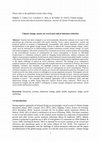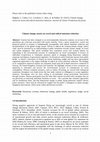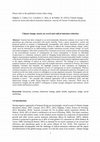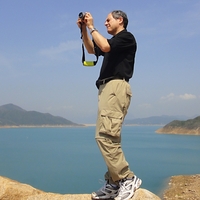Papers by Wiebke Finkler
Sustainable Tourism and Ecological Management, 2014
Human Dimensions of Wildlife, 2004
... proximity to whales (Baird, Otis, & Osborne, 19983. View all referenc... more ... proximity to whales (Baird, Otis, & Osborne, 19983. View all references; Baxter, 19936. Baxter, A. 1993. ... tourism in New Zealand: Environmental issues and options Unpublished Master of Science Thesis , Dunedin: University of Otago. ... The George Wright Forum , 9(34): 7987. ...

Tourism has been critiqued as an environmentally destructive industry on account of the greenhous... more Tourism has been critiqued as an environmentally destructive industry on account of the greenhouse gas emissions associated with tourist mobility. From a policy perspective, current and projected growth in aviation is fundamentally incompatible with radical emissions reduction and decarbonisation of the global energy system. Efforts to address the aviation-climate change ‘policy clash’ must be informed by an understanding of public sentiments towards climate change, air travel and carbon mitigation. This article examines how consumers across four western nations are responding to the environmental excesses of contemporary air travel consumption. It focuses on individual receptiveness to voluntarily measures aimed at changing flying behaviours, industry responses and degrees of government regulation. Its theoretical context harnesses lessons from public health to inform a discussion of bottom up (social marketing, nudge) and top down (government regulation) approaches to the urgent challenge of radical air travel emissions reduction. The findings of its comparative empirical analysis are presented, based upon 68 in-depth interviews conducted in Norway, the United Kingdom, Germany and Australia. We highlight contrasts in how consumers are beginning to internalise and process the environmental excesses of contemporary air travel consumption. Whereas voluntary measures, such as carbon off-setting, are viewed with widespread scepticism, divergence was found across the four study contexts in willingness to accept regulatory measures. Norwegians were far more willing to accommodate strong government intervention through taxation, whereas participants from the other three nations favoured softer strategies that are not perceived as restricting individual freedoms to travel. We conclude that voluntary approaches will be insufficient alone, and that behavioural change in public flying behaviour requires diverse policy measures. These must be informed by insights into the public’s willingness to palate stronger mitigation interventions, which varies within and between societies.
Climate change and sustainable mobility by Wiebke Finkler

Tourism has been critiqued as an environmentally destructive industry on account of the greenhous... more Tourism has been critiqued as an environmentally destructive industry on account of the greenhouse gas emissions associated with tourist mobility. From a policy perspective, current and projected growth in aviation is fundamentally incompatible with radical emissions reduction and decarbonisation of the global energy system. Efforts to address the aviation-climate change ‘policy clash’ must be informed by an understanding of public sentiments towards climate change, air travel and carbon mitigation. This article examines how consumers across four western nations are responding to the environmental excesses of contemporary air travel consumption. It focuses on individual receptiveness to voluntarily measures aimed at changing flying behaviours, industry responses and degrees of government regulation. Its theoretical context harnesses lessons from public health to inform a discussion of bottom up (social marketing, nudge) and top down (government regulation) approaches to the urgent challenge of radical air travel emissions reduction. The findings of its comparative empirical analysis are presented, based upon 68 in-depth interviews conducted in Norway, the United Kingdom, Germany and Australia. We highlight contrasts in how consumers are beginning to internalise and process the environmental excesses of contemporary air travel consumption. Whereas voluntary measures, such as carbon off-setting, are viewed with widespread scepticism, divergence was found across the four study contexts in willingness to accept regulatory measures. Norwegians were far more willing to accommodate strong government intervention through taxation, whereas participants from the other three nations favoured softer strategies that are not perceived as restricting individual freedoms to travel. We conclude that voluntary approaches will be insufficient alone, and that behavioural change in public flying behaviour requires diverse policy measures. These must be informed by insights into the public’s willingness to palate stronger mitigation interventions, which varies within and between societies.

Journal of Cleaner Production, 2016
Tourism has been critiqued as an environmentally destructive industry on account of the greenhous... more Tourism has been critiqued as an environmentally destructive industry on account of the greenhouse gas emissions associated with tourist mobility. From a policy perspective, current and projected growth in aviation is fundamentally incompatible with radical emissions reduction and decarbonisation of the global energy system. Efforts to address the aviation-climate change ‘policy clash’ must be informed by an understanding of public sentiments towards climate change, air travel and carbon mitigation. This article examines how consumers across four western nations are responding to the environmental excesses of contemporary air travel consumption. It focuses on individual receptiveness to voluntarily measures aimed at changing flying behaviours, industry responses and degrees of government regulation. Its theoretical context harnesses lessons from public health to inform a discussion of bottom up (social marketing, nudge) and top down (government regulation) approaches to the urgent challenge of radical air travel emissions reduction. The findings of its comparative empirical analysis are presented, based upon 68 in-depth interviews conducted in Norway, the United Kingdom, Germany and Australia. We highlight contrasts in how consumers are beginning to internalise and process the environmental excesses of contemporary air travel consumption. Whereas voluntary measures, such as carbon off-setting, are viewed with widespread scepticism, divergence was found across the four study contexts in willingness to accept regulatory measures. Norwegians were far more willing to accommodate strong government intervention through taxation, whereas participants from the other three nations favoured softer strategies that are not perceived as restricting individual freedoms to travel. We conclude that voluntary approaches will be insufficient alone, and that behavioural change in public flying behaviour requires diverse policy measures. These must be informed by insights into the public’s willingness to palate stronger mitigation interventions, which varies within and between societies.
Keywords: Emissions, aviation, behaviour change, public health, regulation, nudge, social marketing
Tourism and climate change by Wiebke Finkler

Journal of Cleaner Production , 2015
Tourism has been critiqued as an environmentally destructive industry on account of the greenhous... more Tourism has been critiqued as an environmentally destructive industry on account of the greenhouse gas emissions associated with tourist mobility. From a policy perspective, current and projected growth in aviation is fundamentally incompatible with radical emissions reduction and decarbonisation of the global energy system. Efforts to address the aviation-climate change ‘policy clash’ must be informed by an understanding of public sentiments towards climate change, air travel and carbon mitigation. This article examines how consumers across four western nations are responding to the environmental excesses of contemporary air travel consumption. It focuses on individual receptiveness to voluntarily measures aimed at changing flying behaviours, industry responses and degrees of government regulation. Its theoretical context harnesses lessons from public health to inform a discussion of bottom up (social marketing, nudge) and top down (government regulation) approaches to the urgent challenge of radical air travel emissions reduction. The findings of its comparative empirical analysis are presented, based upon 68 in-depth interviews conducted in Norway, the United Kingdom, Germany and Australia. We highlight contrasts in how consumers are beginning to internalise and process the environmental excesses of contemporary air travel consumption. Whereas voluntary measures, such as carbon off-setting, are viewed with widespread scepticism, divergence was found across the four study contexts in willingness to accept regulatory measures. Norwegians were far more willing to accommodate strong government intervention through taxation, whereas participants from the other three nations favoured softer strategies that are not perceived as restricting individual freedoms to travel. We conclude that voluntary approaches will be insufficient alone, and that behavioural change in public flying behaviour requires diverse policy measures. These must be informed by insights into the public’s willingness to palate stronger mitigation interventions, which varies within and between societies.











Uploads
Papers by Wiebke Finkler
Climate change and sustainable mobility by Wiebke Finkler
Keywords: Emissions, aviation, behaviour change, public health, regulation, nudge, social marketing
Tourism and climate change by Wiebke Finkler
Keywords: Emissions, aviation, behaviour change, public health, regulation, nudge, social marketing